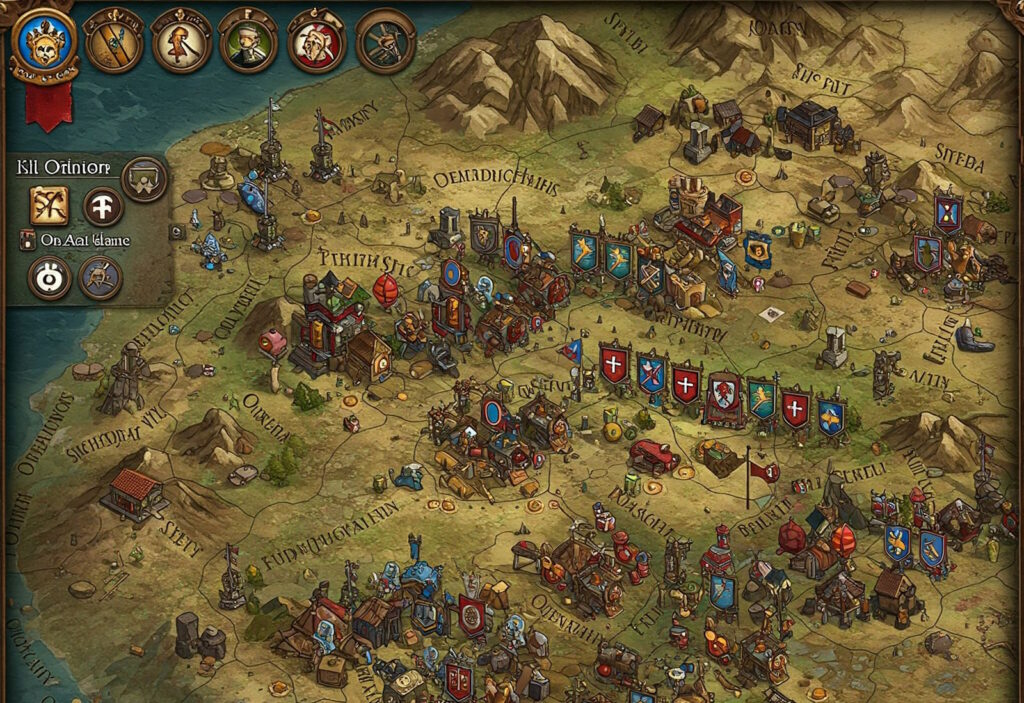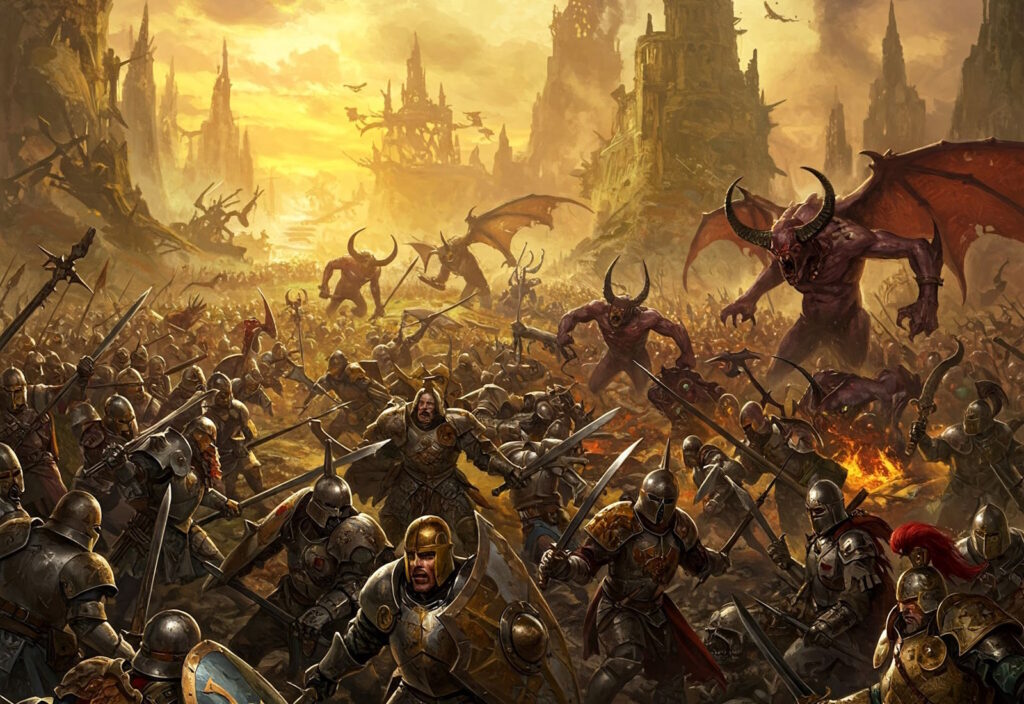Introduction to Grand Strategy Games
Grand strategy games occupy a unique place within the gaming landscape, combining intricate gameplay with expansive historical narratives. Unlike traditional strategy games, which often focus on tactical battles or resource management in shorter time frames, grand strategy titles encourage players to engage in long-term planning and decision-making that can span decades or even centuries. This genre’s distinctiveness lies in its immersive scope; players assume control of a nation, reigning over its affairs by managing a multitude of systems including military, economy, diplomacy, and territorial expansion.
One defining characteristic of grand strategy games is their emphasis on historical accuracy and depth. Players don’t just find themselves in a vacuum; rather, they navigate real historical events, figures, and factions, all while striving to reshape or maintain their nation’s trajectory. This deep historical context often enhances player engagement, as they can explore various outcomes of world events based on their strategic choices, thus allowing for a high degree of replayability.
Moreover, the complexity of decision-making in grand strategy games elevates the challenge for players. Each decision can have far-reaching implications that resonate throughout the game. Managing resources effectively is critical; players must allocate their nation’s finances, manpower, and technological advancements wisely to ensure survival and growth. Furthermore, diplomacy plays a vital role as players must interact with other nations, forming alliances or rivalries that can either bolster or hinder their ambitions.
The combination of these elements creates a uniquely engaging experience, inviting gamers to immerse themselves in a world where the stakes are high, and every action counts. Ultimately, grand strategy games reward patience, foresight, and strategic acumen, establishing them as a distinctive and cherished genre in the realm of video gaming.
A Brief History of Europa Universalis IV
Europa Universalis IV (EU IV) emerged from the esteemed lineage of the Europa Universalis series, which was first introduced by Paradox Interactive in 2000. The fourth iteration of this grand strategy game was officially released on August 13, 2013. It was developed by a talented team at Paradox Development Studio, which focused on enhancing the intricate mechanics that made the series famous while attracting new players with updated graphics and refined gameplay. EU IV builds upon the foundations laid by its predecessors, offering a more immersive experience in terms of economics, diplomacy, and military strategy.
Since the release of its initial version, EU IV has undergone substantial evolution through numerous updates and expansion packs, contributing to its position as a hallmark of the grand strategy genre. Notable expansions such as “Wealth of Nations,” “Common Sense,” and “Mandate of Heaven” have added layers of depth, further refining game mechanics and introducing fresh content that keeps both new and seasoned players engaged. Each expansion not only enriches the gameplay but also allows for diverse strategies and historical scenarios, maintaining the game’s relevance over time.
The community’s response to EU IV has been overwhelmingly positive, characterized by a passionate player base that actively participates in forums, creating mods and custom content that enhance the gameplay experience. Paradox Interactive has fostered this community engagement through regular updates and responses to player feedback, providing patches that address issues and integrate new ideas. This feedback loop has helped solidify Europa Universalis IV’s place in the grand strategy spectrum, demonstrating its ability to adapt and innovate in a constantly evolving gaming landscape.
Gameplay Mechanics: A Deep Dive
Europa Universalis IV (EU4) presents a complex tapestry of gameplay mechanics that lay the groundwork for a deeply engaging grand strategy experience. Central to the mechanics is the concept of nation building, where players assume control of a country and navigate through the intricacies of governance, diplomacy, and war. Each player’s decisions directly influence national success and territorial ambition, showcasing the strategic depth integral to the game.
Diplomacy, another cornerstone of EU4, allows players to forge alliances, establish trade agreements, and manipulate rival nations. The balance of power shifts continuously; thus, mastering the diplomatic nuance is essential for maintaining a healthy state. Dynamic geopolitical relationships necessitate careful calculation, emphasizing how players must balance friendship and enmity as they strive for dominance. Engaging in diplomatic negotiations can lead to significant advantages, from forming powerful coalitions to acquiring vital resources.
War mechanics in EU4 further enhance the gameplay, with a comprehensive system that includes military tactics and fortifications. Players must build and maintain their armies, making strategic decisions about troop composition and battlefield tactics. Additionally, the game rewards players for understanding the diverse combat mechanics, including terrain advantages and morale; successful military campaigns greatly increase a nation’s standing and expansion opportunities.
The economy system adds another layer of complexity, demanding players manage resources, negotiate trade routes, and develop infrastructure. The introduction of the trade system is particularly noteworthy, as it allows countries to engage in commerce, manipulating the market to their advantage. Engaging with the trade networks can yield substantial economic benefits if approached intelligently.
Innovative features such as the idea system distinguish EU4 from its predecessors, allowing players to customize their nation’s strategies and capabilities. By investing in different ideas, countries can enhance military prowess, strengthen their economy, or improve diplomatic relations, providing tailored approaches to nation management.
Ultimately, the intricate gameplay mechanics of Europa Universalis IV coalesce to create an immersive experience, elevating it to the pinnacle of grand strategy games.
Modding Community and User-Generated Content
The modding community surrounding Europa Universalis IV (EU4) plays an instrumental role in enhancing and expanding the game’s lifespan. This vibrant community thrives on creativity and innovation, offering players an array of modifications that can significantly alter gameplay experiences. Some mods provide total conversions, introducing entirely new scenarios, historical contexts, and gameplay mechanics, whereas others focus on quality-of-life improvements that refine the core game’s systems, ensuring a more polished experience for users.
One of the remarkable aspects of the EU4 modding scene is the accessibility of tools and resources for aspiring modders. Paradox Interactive, the developer behind Europa Universalis IV, has provided a robust modding framework, allowing players to easily create and share their own content. The availability of tools like the Clausewitz engine and various scripting options empowers modders to implement complex changes without requiring extensive programming knowledge. Consequently, even those new to the world of game development can contribute to the modding landscape.
User-generated content significantly impacts the game’s longevity, keeping the player base engaged well beyond its initial release. Many mods not only add new features or scenarios but also address balance issues, ensuring a continually evolving and competitive ecosystem. Online platforms such as the Steam Workshop serve as vibrant hubs for mod distribution, enabling easy access and enabling players to discover new content quickly. With thousands of mods available, ranging from minor tweaks to major overhauls, Europa Universalis IV remains a fresh and dynamic experience. This outpouring of creativity and dedication from the modding community solidifies the game’s status as a cornerstone of the grand strategy genre.
Multiplayer Experience: Connecting Players Worldwide
Europa Universalis IV has carved out a significant niche within the realm of grand strategy games, largely due to its engaging multiplayer experience. From its inception, this title has evolved, allowing players from different parts of the world to connect and collaborate in a shared historic narrative. The game’s design encourages not just competition but also cooperation, as players work together or against each other while attempting to expand their empires and achieve national objectives.
One of the unique challenges of multiplayer gameplay in Europa Universalis IV lies in the intricate strategies that players must adopt. As players control nations, the dynamic nature of alliances, betrayals, and international diplomacy heightens the tension and excitement of each session. To succeed, participants must communicate effectively, negotiate with one another, and adapt their strategies based on shifting alliances and rivalries. This interaction fosters a sense of camaraderie and rivalry, transforming a solitary gaming experience into a shared adventure where every player contributes to the unfolding story.
The community surrounding Europa Universalis IV is vibrant and active, with numerous tournaments and events organized regularly. These tournaments offer players a platform to showcase their skills and strategies in a competitive environment. Participants often engage deeply with one another, sharing tactics and forming friendships that extend beyond the game. Such community interactions are further supported by various online forums and platforms where players can discuss strategies, share their gameplay experiences, and even form alliances for upcoming games.
This sense of global connection is undeniably one of the game’s most compelling aspects. As players across different time zones log in to battle for supremacy, the shared passion for strategy and historical insights creates a rich tapestry of interaction that enhances the overall multiplayer experience. Through cooperation and competition, Europa Universalis IV continues to stand as a testament to the potential of online multiplayer formats in fostering unique and memorable player interactions.
Comparative Analysis with Other Grand Strategy Games
Europa Universalis IV (EU4) has long been regarded as a cornerstone of the grand strategy genre, influencing both players and developers alike. When comparing this title to its peers, such as Crusader Kings III, Total War series, and Stellaris, several distinctions emerge that highlight EU4’s unique position in the market.
One of the most prominent differences lies in the thematic focus of these games. While Crusader Kings III prioritizes feudal dynasties and personal relationships within a medieval context, EU4 shifts its focus towards nation-building and global diplomacy, encapsulating a broader historical period from 1444 to 1821. This distinction enables players in EU4 to engage in complex geopolitical maneuvering and statecraft, catering to those who enjoy intricate systems of governance and international relations.
Gameplay styles further diverge among these titles. In EU4, the mechanics allow for deep economic development, trade mastery, and military tactics that require prudence and planning, whereas the Total War series tends to emphasize real-time tactical battles alongside grand strategy elements. This results in a more action-oriented experience compared to EU4’s analytical and methodical gameplay. Players in EU4 often appreciate the meticulous planning required to achieve specific objectives over extended periods, fostering a sense of accomplishment through long-term strategic thinking.
In terms of community engagement, all these games share robust player bases. However, the community surrounding EU4 is characterized by its dedicated focus on historical accuracy and complexity. Mods and expansions significantly enrich the experience, allowing players to customize their gameplay, whereas other titles like Stellaris leverage a more science-fiction aesthetic, attracting a different subset of players. EU4, therefore, stands out as a benchmark, drawing strategy enthusiasts who relish the depth and breadth of managing a nation through tumultuous historical landscapes.
The Role of Historical Accuracy in Gameplay
Europa Universalis IV (EU4) stands as a remarkable testament to the seamless integration of historical accuracy within the framework of grand strategy gaming. The developers have meticulously woven historical events, figures, and timelines into the fabric of its gameplay, thereby crafting an experience that not only entertains but also educates players about significant epochs in world history. By drawing upon a rich tapestry of real-world occurrences, the game imparts a sense of authenticity that enhances player immersion.
One of the key ways in which historical accuracy influences gameplay is through the incorporation of notable historical figures. Each leader, general, or monarch comes with unique skills and traits that reflect their real-life counterparts, influencing diplomatic relations, military engagements, and governance. This aspect encourages players to engage with history actively, as they must navigate the political intricacies and challenges posed by these personalities. Consequently, players often find themselves making decisions that mirror historical strategies, creating a dynamic interplay between knowledge of history and gameplay mechanics.
Moreover, the game developers have embedded essential historical events that can shape the course of play. These events, such as the Protestant Reformation or the Age of Exploration, trigger specific circumstances that can drastically alter a player’s strategy. Such an integration ensures that players are consistently faced with decisions that echo the strategic dilemmas of the time, promoting a deeper understanding of historical context. With each playthrough, the intersection of history and gameplay not only enriches the gaming experience but also challenges players to consider how historical forces can interplay with their actions.
In conclusion, the balance of historical accuracy in Europa Universalis IV serves not only to enhance the gameplay but also to engage players in a nuanced exploration of the past, ultimately establishing it as a pillar of grand strategy gaming.
Future of Europa Universalis IV: What Lies Ahead?
As Europa Universalis IV continues to captivate grand strategy enthusiasts, it’s natural to contemplate the future trajectory of this beloved title. With its dynamic gameplay and extensive historical depth, the potential for expansions and updates remains strong. Players often express a desire for additional content that can enhance their experience and broaden the scope of the game. One avenue that could be explored is the introduction of new regions or cultures, allowing for intricate diplomatic strategies and broader customization options.
The community has shown a keen interest in deeper gameplay mechanics related to trade and warfare. Future updates might dive into these areas, refining existing systems or introducing entirely new mechanics. Historical events could also be a rich vein to mine, potentially adding a layer of unpredictability that reflects real-world outcomes while allowing players to create alternative histories. The modding community has demonstrated remarkable creativity; thus, Paradox Interactive may also choose to incorporate some of the most popular fan-made mods into official expansions to attract a wider audience.
Looking at trends in the gaming industry, it is likely that Paradox will continue to prioritize long-term engagement and player feedback. The concept of seasonal content updates has gained traction, and applying this to Europa Universalis IV could keep the game fresh and relevant. Additionally, as technology advances, players might expect improved graphics and user interface enhancements that support better gameplay experiences.
Overall, the future of Europa Universalis IV appears bright, with several promising avenues for expansion. By fostering an ongoing dialogue with its community and remaining receptive to the evolving landscape of gaming, Paradox ensures that Europa Universalis IV will retain its stature as a king of grand strategy in the coming years.
Conclusion: Why Europa Universalis IV Remains Unmatched
In the vast landscape of grand strategy games, Europa Universalis IV holds a unique position as a paragon of depth and complexity. This game has continually proven why it is the preeminent choice for strategy enthusiasts. One of the most significant factors contributing to its enduring appeal is the intricate simulation of historical events and the sheer freedom it offers players in shaping the destinies of nations. Players can engage in diplomatic maneuvers, military conquests, or economic development, all while navigating the intricacies of a detailed world map that reflects the real geopolitical climate of the early modern era.
Europa Universalis IV’s extensive customization options allow players to influence gameplay in a variety of ways. The unique national ideas and policies available to each country provide a rich tapestry of paths to victory. This level of diversity ensures that every playthrough feels distinct, encouraging players to explore different strategies and outcomes. In addition, the game’s community-driven expansions and mods contribute to a continually evolving experience, consistently introducing new features, historical events, and gameplay mechanics that keep players engaged.
The impact of Europa Universalis IV on the genre cannot be overstated. It has set a high standard for other grand strategy games, influencing their design and gameplay mechanics. The unprecedented level of detail and player agency has encouraged a deeper engagement with history, prompting many players to delve into the historical contexts behind their in-game actions. This educational aspect further cements its legacy within the gaming community and enhances players’ appreciation for historical events.
In conclusion, the combination of unparalleled gameplay depth, community support, and lasting historical impact solidifies Europa Universalis IV as the king of grand strategy games. Its ability to captivate and educate players ensures that it will remain a timeless classic for years to come.



